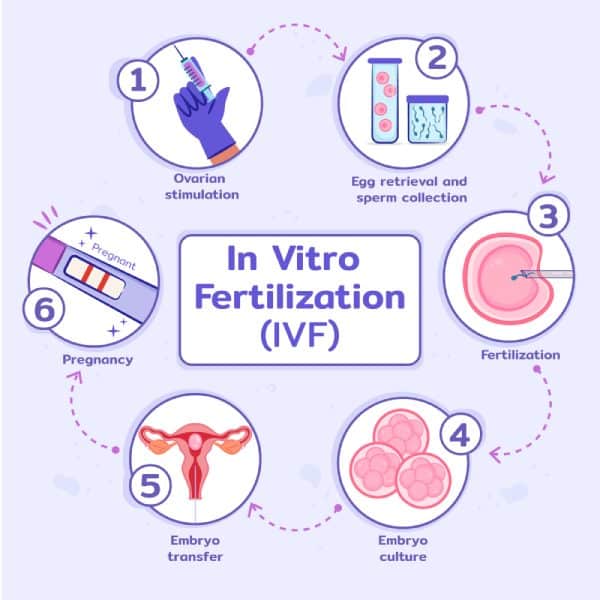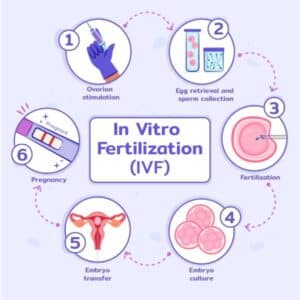If you’re considering IVF treatment, chances are you’ve been on a journey filled with hope, questions, and maybe a few challenges along the way. You’re not alone many people face fertility struggles, and the good news is that there are options available to help.
IVF is one of the most effective infertility treatments, but if you’re just starting to explore it, you might have a lot on your mind:
How does the process work? Is it safe? How many cycles will I need? What are the chances of success?
These are important questions, and the more you understand, the more confident you’ll feel about your next steps. We’re here to take you through an IVF treatment step by step explaining what happens, what to expect, and how you can prepare.
Every fertility journey is different, but knowledge and support can make all the difference. Let’s walk through this together.
What is IVF, and Why Is It So Popular?
In simple terms, IVF (In Vitro Fertilisation) is a process where eggs and sperm are combined outside the body in a lab. Once fertilised, the healthiest embryo is transferred back into the uterus, where it implants and grows into a pregnancy.
Now, one of the most common questions is: How does IVF differ from other fertility treatments?
While treatments like the IUI procedure (where sperm is directly placed in the uterus) can work for some couples, IVF is often recommended when:
- Fallopian tubes are blocked
- Female infertility causes like PCOS, endometriosis, or ovulation disorders are present
- There are issues with sperm quality (male infertility treatment)
- Other treatments haven’t worked
For women considering egg freezing cost, understanding IVF and all that it involves can be helpful with the egg retrieval procedure being similar for both treatments.
Your IVF Journey: Step by Step
Considering IVF? Let’s walk through the process, one step at a time. IVF can feel overwhelming, but when broken down into clear steps, it becomes easier to understand and navigate.
Step 1: Fertility Consultation & Testing
Your first visit to a fertility clinic is about understanding your body and exploring your options. Your doctor will discuss your medical history, lifestyle, and any previous attempts at conception. This is followed by a series of tests, such as:
- Blood work to check hormone levels
- Ultrasounds to examine your ovaries and uterus
- Sperm analysis for male infertility treatment
These tests help your fertility specialist design a customised infertility treatment plan tailored to your needs.
This is also where you can ask all your questions so don’t hold back!
Step 2: Ovarian Stimulation (Boosting Egg Production)
To improve your chances of success, IVF starts with ovarian stimulation a phase where daily hormone injections help your ovaries produce multiple eggs instead of just one. This phase lasts about 10–14 days and comes with regular ultrasounds and blood tests to track progress. Some women feel mild bloating or mood swings, but these side effects are temporary.
Every IVF journey is unique some conceive in the first cycle, while others need a few attempts. Your doctor will guide you through what’s best for your body.
A helpful tip: Staying hydrated and getting enough rest can help ease any discomfort.
Step 3: Egg Retrieval (A Quick & Painless Procedure)
Once your eggs are ready, a trigger shot helps finalise their development. About 36 hours later, your doctor retrieves the eggs in a quick, 20–30 minute procedure under mild sedation. A thin needle is used, and most women go home the same day, feeling only mild cramping or bloating.
If you’re looking into egg freezing costs, this is the same stage where eggs would be collected and frozen for future use.
Since IVF involves lab work, medication, and expert care, costs can add up. Many fertility clinics offer payment plans to make treatment more accessible.
Step 4: Fertilisation
Once retrieved, your eggs are combined with sperm in a lab. This can happen through:
Conventional IVF: Sperm and eggs are mixed in a petri dish, allowing fertilisation to happen naturally.
ICSI (Intracytoplasmic Sperm Injection): A single healthy sperm is injected directly into an egg, often used in cases of male infertility.
Over the next few days, embryologists monitor their development. Some clinics use Smart IVF technology to pick the healthiest embryos, improving success rates. Even women who’ve gone through menopause can conceive with donor eggs or frozen eggs, as long as their uterus is healthy.
Step 5: Embryo Transfer
After 3–5 days, the best embryo is selected and transferred into your uterus through a quick, painless procedure that feels similar to a Pap smear. No anesthesia is needed, and you can resume light activities right after.
To improve implantation chances, it’s best to:
- Avoid intense workouts or heavy lifting
- Keep stress levels low
- Eat a balanced, fertility-friendly diet
IVF pregnancies are just as safe as natural pregnancies, with medical advancements improving success rates.
Step 6: The Two-Week Wait & Pregnancy Test
This is often the toughest part waiting 10–14 days before taking a pregnancy test. You may feel mild cramping, breast tenderness, or light spotting these could be early pregnancy signs or just side effects of medication.
IVF success rates vary, but for women under 35, chances range between 40–60% per cycle. Some couples conceive in one cycle, while others may need multiple rounds.
Boosting IVF Success: What You Can Do
While IVF is a medical process, your lifestyle plays a huge role in its success. Here are a few things you can do to boost your chances:
Follow a fertility-friendly diet: A balanced fertility diet rich in protein, antioxidants, and healthy fats can support reproductive health.
Manage stress: Stress can impact fertility, so try relaxation techniques like meditation or yoga.
Maintain a healthy weight: Being underweight or overweight can affect your hormone levels.
Avoid smoking & excessive alcohol: Both can lower fertility rates.
Begin Your Journey to Parenthood with the Right Fertility Specialist
Deciding to undergo IVF is a big step, but you’re not alone. With the right fertility clinic, expert guidance, and a supportive mindset, you’re giving yourself the best possible chance to welcome a little one into your life.
If you’re thinking about IVF, take that first step; talk to a fertility expert, ask your questions, and trust that this journey, while challenging, can be incredibly rewarding.
Common IVF Questions You Need Answered
Is IVF pregnancy safe?
Yes! IVF pregnancies are just as safe as natural pregnancies, and your doctor will monitor everything closely.
How many IVF cycles will I need?
This varies for each woman. Some couples succeed on the first try, while others may need multiple rounds. Factors like age and health play a big role in determining this.
Why is IVF a costly treatment?
IVF involves advanced medical technology, skilled specialists, and lab procedures, all of which add to the cost. If cost is a concern, ask your clinic about financial options or insurance coverage.
What is Smart IVF?
Smart IVF is an advanced technique using AI and automation to improve success rates. It is also one of the latest innovations in fertility treatment.
Do multiple rounds of IVF increase the risk of cancer?
While this is a common misconception, research suggests no significant link between IVF and cancer risk.
What are the side effects of IVF?
Some women experience bloating, mood swings, or mild discomfort from hormone treatments, but these are temporary. Your doctor will guide you on how to manage any side effects.
Can IVF help with PCOS -related infertility?
Yes! IVF is a highly effective option for women with PCOS and infertility, helping regulate ovulation and improve chances of conception.


